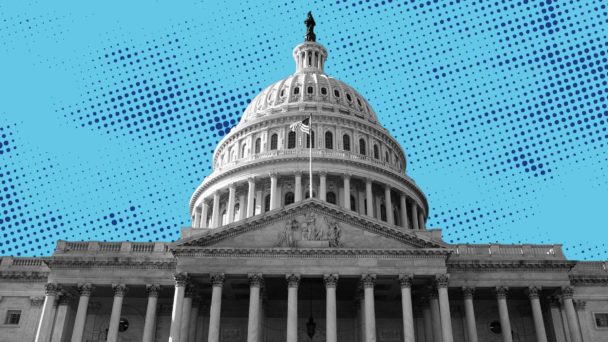Judicial nominee Adeel Mangi published a scathing letter to President Joe Biden on Monday denouncing the Senate’s process for confirming judges as “fundamentally broken” and criticizing the Senate itself for its moral cowardice. Mangi, a law firm partner, was nominated for a seat on the U.S. Court of Appeals for the Third Circuit way back in November 2023. If confirmed, he would have been the first Muslim federal appellate judge. But his nomination stalled for over a year as Republicans subjected him to blatantly Islamophobic attacks. Republicans peddled a fiction in digital ads, op eds, and other public remarks that likened Mangi to a leader of a jihad, when in reality, he’s a litigator in New Jersey.
Rightwing advocates launched advertisements characterizing Mangi as an “antisemite” who “refused to condemn” terrorism. “Horrifying images were published with the Hamas flag substituted for my eyes or interspersing my face with footage of the twin towers on fire,” Mangi wrote. Over a dozen prominent Jewish organizations defended him from the baseless accusations, yet as Mangi recounted in the letter to Biden, his opponents were undeterred: “These same attackers pivoted focus to a new absurdity” and claimed that he “supported the killings of police officers.” These claims did not randomly propagate from the fringes, as their falsity and offensiveness might suggest. Mangi pointed to remarks about the funding made by Senator Sheldon Whitehouse on the Senate floor and described the attacks as “an organized smear campaign fueled by dark money.”
As conservative activists spread Islamophobic lies about Mangi in commercials, Republican electeds engaged in bigoted mudslinging in Congress. “Senators, led by the Minority Leader himself, launched regular attacks on me online and on the Senate floor as an antisemite radical,” Mangi wrote. During his hearing before the Senate Judiciary Committee, instead of asking Mangi any questions about his qualifications or legal philosophy, Senate Republicans badgered him with absurd and demeaning questions about Israel, Hamas, and the September 11th attacks. “The underlying premise appeared to be that because I am Muslim, surely I support terrorism and celebrate 9-11,” said Mangi. Similarly, he reasoned, “the notion that as a Muslim I surely support violence, including against law enforcement,” underpinned the spurious claims about his supposed support for killing cops.
Judicial confirmation hearings are an unbearable sort of performance art even when not trafficking in ugly stereotypes. Senators rarely ask meaningful questions. If they do, nominees don’t provide meaningful answers. And when Senators deliberately misconstrue the professional and life experiences of judicial hopefuls—creating and then attacking unfair caricatures of their views—the nominees must grin and bear it if they want any chance of getting the job. As Mangi put it in his letter, “I accepted these farcical attacks with the silence demanded of judicial nominees in service of my country.”
But Mangi is not bound by the constraints of propriety any longer. Last month, Senate Majority Leader Chuck Schumer agreed to sacrifice lingering appellate nominees in exchange for Senate Republicans’ acquiescence on confirming the remaining nominees for district court judgeships. As a result, Mangi said, there will be no vote on his nomination that would “requir[e] Senators to show who they are.” Mangi acknowledged in his letter to Biden that he now has “no pathway to confirmation.” His new path permits him to publicly acknowledge that the whole rigmarole Congress put him through was some inexcusable, bigoted bullshit.
In a letter to Biden, Adeel Mangi calls out the 3 Dem senators who caved to the GOP's Islamophobia: "They lack the wisdom to discern the truth, which exposes a catastrophic lack of judgment; or they used my nomination to court conservative voters, which exposes a catastrophic lack of principle."
Mangi excoriated Republicans for their “performative outrage” over his nomination, rightly describing Republicans’ accusations as “ludicrous” and “twisted.” He also reserved special condemnation for “three Democratic Senators who surrendered to this campaign,” referring to Senators Catherine Cortez Masto and Jacky Rosen of Nevada, and Senator Joe Manchin of West Virginia. Masto and Rosen both embraced the anti-cop smear as justification to oppose Mangi’s confirmation, demonstrating what Mangi described in the letter as either a “catastrophic lack of judgment” or a “catastrophic lack of principle.” Manchin earned Mangi’s rebuke by announcing that he would only vote for a nominee if at least one Republican did, effectively joining any Republican party-line vote to block a confirmation. “To fetishize bipartisanship amidst an outrageous attack campaign is not a virtue—it is a preening abandonment of morality,” Mangi wrote.
Part of what makes Mangi’s letter remarkable is that it isn’t just about his nomination, but about overcoming the nation’s capitulation to Islamophobia and racism. He catalogued the the torrent of thinly-veiled discrimination Congress put him through “so that this playbook will be recognized the next time a Muslim is nominated to a prominent position of service,” and he admonished the country’s leaders, calling on them to show some courage. “These forces are fueled not only by their proponents, but equally by the collaboration and silence of the spineless,” he wrote. Mangi will not be the first Muslim to sit on a federal appellate court, but he forcefully rejected the notion that bigots—and those who aid them by having the moral backbone of a jellyfish—will so easily be able to exclude Muslims from public service in the future. “Our Constitution forbids religious tests for any Office of the United States and American Muslims will cherish that fundamental American value, even if others apply it only selectively,” he wrote.
There is a long history of attorneys from marginalized backgrounds who uplift the aspirations of the Constitution, as Mangi did, and fight to fulfill the law’s unkept promises. This is a perspective that the judiciary desperately needs, and it is kept out in part by a confirmation process that is hostile to anyone whose work or simple existence challenges the oppressive systems that the American legal order upholds. Mangi’s letter is a rare public denunciation of that process, and should motivate Democrats to actually fight for those nominees most likely to face such attacks. After all, those are the people who are most familiar with the law’s broken promises, and they would be the judges most likely to hold the law to its word.




